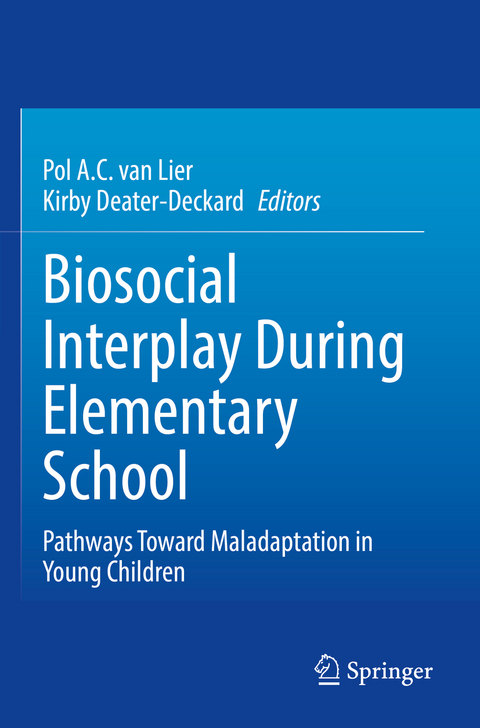
Biosocial Interplay During Elementary School
Springer International Publishing (Verlag)
978-3-031-07111-9 (ISBN)
This book examines the effects of social relations during primary school on children's neurobiology and pathways to maladaptation. It explores the ways in which after the transition to primary education children, supervised by teachers, need to function with their peers. The volume addresses issues affecting 10% to 20% of children who become poorly accepted or victimized by peers, receive low support by teachers or even have conflictual relations with teachers, and may perceive the classroom as a whole as nonsupportive.
Key areas of coverage include:
- Detrimental effects of such social experiences, providing an overview of how such experiences affect children's neurobiology factors to understand why these children develop maladaptive outcomes.
- Manifestations of social relations, their complexity, interrelations, and pathways leading to the maladaptive outcomes.
- How genetic factors may evoke children's social environment and make them susceptible to its impact (e.g., findings on DNA methylation at both epigenome-wide level as well as on particular loci on candidate genes).
- Links between social environmental stressors and the psychophysiology of elementary school children and reviews both links with the autonomic nervous system as well as with the HPA-axis.
- The impact of social experiences on neurocognitive function development, decision making, and structural and functional brain development and discusses implications for research, prevention, and intervention.
Biosocial Interplay During Elementary School is a must-have resource for researchers, professors, and graduate students as well as clinicians and other professionals in clinical child, school, and developmental psychology, educational psychology/policy and politics, social work, neuroscience, public health, and all related disciplines.
lt;p>Pol A.C. van Lier, Ph.D., is Professor of Developmental Psychopathology at the Vrije Universiteit Amsterdam. Dr. van Lier conducts research and teaches courses on the interplay between environment and biological influences on children and adolescent pathways to psychopathology. The emphasis is on the impact of school and family social environmental stressors on children and adolescent stress-, and self-regulation, and the neuropsychological, neurological, psychophysiological and genetic mechanism underlying this. His research is currently funded by the European Research Council and Netherlands Scientific Organization. He has published in journals spanning developmental psychopathology, developmental, psychiatric, neurological, school and family sciences.
Kirby Deater-Deckard, Ph.D., is Professor of Developmental Science, and Neuroscience and Behavior, and Director of the Healthy Development Initiative, in the Department of Psychological and Brain Sciences at University of Massachusetts, Amherst. He has been a Fellow of the Association for Psychological Science since 2008. Dr. Deater-Deckard conducts research and teaches courses on biological and environmental influences on individual differences in social-emotional and cognitive development in childhood and adolescence. The emphasis in this work is on intergenerational transmission, gene-environment mechanisms, neurological and physiological development, and home and school environments. His publications span developmental and family sciences and developmental psychopathology areas, with research currently and previously funded by NSF and NIH. With Robin Panneton, he co-edited the volume, Parental Stress and Early Child Development (Springer, 2017).
Chapter 1. Elementary School Social Experiences with Peers and Teachers: Manifestation and Development.- Chapter 2. Elementary School Social Relations with Teachers: Peers and Pathways to Maladaptation.- Chapter 3. School Social Relations and Child Development: Gene-Environment Interplay.- Chapter 4. Bully Victimization, Adverse School Social Experiences and DNA Methylation.- Chapter 5. Stress Regulation During the Elementary School Years: Links with Social Experiences.- Chapter 6. School Social Relations, Self-Regulation and Social Decision Making.- Chapter 7. School Social Relations and Neural Responses.- Chapter 8. Primary School Social Experiences and the Neurobiology of Children.
| Erscheinungsdatum | 16.08.2023 |
|---|---|
| Zusatzinfo | V, 213 p. 6 illus., 2 illus. in color. |
| Verlagsort | Cham |
| Sprache | englisch |
| Maße | 155 x 235 mm |
| Gewicht | 343 g |
| Themenwelt | Geisteswissenschaften ► Psychologie ► Pädagogische Psychologie |
| Medizin / Pharmazie ► Medizinische Fachgebiete ► Psychiatrie / Psychotherapie | |
| Technik ► Umwelttechnik / Biotechnologie | |
| Schlagworte | Academic achievement and social experiences at school • Adverse school social experiences and DNA methylation • Behavioral genetics and child development • Bullying and child development • Elementary school and cognitive development • Friendships and children • Gene-environment interplay and child development • Kindergarten and social-emotional development • Maladaptation and early child development • Neural responses and early social interactions • Neurogenetics, epigenetics, and child development • Peer relationships and early childhood • Psychopathology and child development • Psychophysiology and child development • School and classroom environments • Social decision making and child development • Social neuroscience and child development • Social self-regulation during childhood • Social stress-regulation and elementary school • teacher-student relationships |
| ISBN-10 | 3-031-07111-5 / 3031071115 |
| ISBN-13 | 978-3-031-07111-9 / 9783031071119 |
| Zustand | Neuware |
| Haben Sie eine Frage zum Produkt? |
aus dem Bereich


